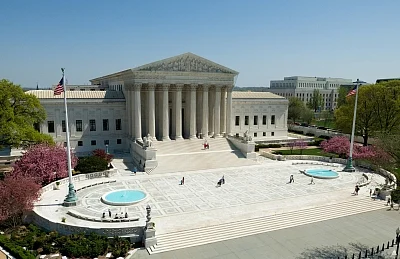The United States Supreme Court ruled in favour of the Biden administration on a controversial immigration policy on Thursday, 30 June. The highest court in the country said the administration had the authority to overturn a Trump-era policy that requires asylum seekers to "remain in Mexico" until their petitions were reviewed by the US courts.
In a five to four vote, Chief Justice John G Roberts Jr wrote for himself and Justice Brett M Kavanaugh, in addition to the three liberal judges, Stephen G Breyer, Sonia Sotomayor, and Elena Kagan.
According to the federal immigration law, the executive branch has the discretion to return asylum seekers to Mexico, "but is not required to do so," said Roberts.
Justices Clarence Thomas, Samuel A Alito Jr, Neil M Gorsuch, and Amy Coney Barrett dissented.
Barrett said even though she agreed with the majority, her reason for dissenting was that the court should not have decided the case and should have referred it to lower courts.
Writing for himself, Thomas and Gorsuch, Justice Alito said the Department of Homeland Security should not be able to "simple release into this country untold numbers of aliens who are very likely to be removed if they show up for their removal hearings. This practice violates the clear terms of the law, but the Court looks the other way."
This decision comes on the heels of a recent tragedy on the outskirts of San Antonio, Texas, where 51 migrants died of heat exhaustion and dehydration in an abandoned tractor-trailer presumably trying to enter the US illegally.
Migrant Protection Protocols: 'Remain in Mexico' Policy
The issue was about the Migrant Protection Protocols (MPP) that were implemented during the Trump Administration. It is also known as the "Remain in Mexico" policy which requires some asylum seekers who enter the United States illegally, mainly from Central and South America, to return to Mexico while waiting for a hearing.
Former President Donald Trump had said the MPP was essential to stop "a flood of meritless asylum claims by migrants seeking to be released into the United States," according to a report by The Washington Post.
The Supreme Court justices put the review of Biden's attempt to get rid of the "Remain in Mexico" policy because a judge from a lower court claimed that the Biden administration had failed to provide enough justification for ending the Trump-era policy, adding that the incumbent administration's processes were "unlawful".
Biden Administration's Next Move
After taking office, Biden said that the administration would discontinue enrolling migrants into the MPP. He ordered a review of the policy citing that the Trump-era law was putting asylum seekers to dangerous conditions such as torture and rape apart from creating complications in their asylum hearings in the United States.
According to the Biden administration, the merits of the programme were "outweighed by its domestic, humanitarian, and foreign policy costs."
However, Texas district court Judge Matthew Kacsmaryk ruled that the Biden administration had not explained its reasons for cancelling the policy completely. Moreover, he ruled that the new procedures put in place by the Biden administration violated federal immigration law.
A federal appeals court ended up upholding the district court judge's decision. The Supreme Court scheduled an expedited hearing instead of intervening last summer at the behest of the Biden administration.
Now, the case is back in Texas federal court. The Biden administration would have to act fast in order to win the case.
'Remain In Mexico' Policy By the Numbers
According to a report by The Texas Tribune, about 70,000 asylum seekers have been sent to Mexico through the Trump-era policy. Multiple refugee camps have been set up on the Mexican side of the US-Mexico border.
These refugee camps have turned into a ground for kidnappers and drug cartels. The program meresumed in December 2022. Since then, immigration officials have enrolled about 5,100 migrants as of 31 May.
The Supreme Court's recent ruling does not impact Title 42 which is an emergency health order that has been used by the immigration officials to expel migrants at the border without them getting an opportunity to file for an asylum. Thus, fewer people get the chance to make a claim for asylum and even fewer are able to enrol in "remain in Mexico."
(With inputs from The Texas Tribune and The Washington Post)
(At The Quint, we question everything. Play an active role in shaping our journalism by becoming a member today.)
